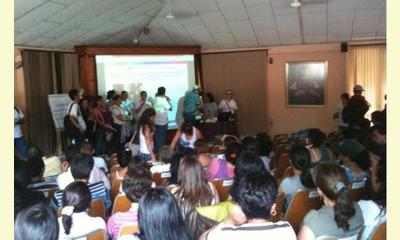|
|
Coexistence and School Protection: Teachers Network in Bogota Colombia
un article par Amada Benavides de Peréz, Schools of Peace Foundation
The Schools of Peace Foundation and the Secretary of Education, Bogota Capital District have established a network of Peace Educators in the framework of CIPE – Colombia (Community Based Institute on Peace Education) and the International Institute of Peace Education (IIPE). The general purpose of the network is to promote the exchange of knowledge between teachers of all the education levels, in order to transform them into agents that live and multiply the ideas of Culture of Peace, Human Rights and International humanitarian law through peace education.

Participants of the Closing Ceremony event
click on photo to enlarge
The specific objectives are: To integrate the Peace Educators Network (in 20 schools participating in the Project “Coexistence and School Protection”) with the CIPE - IIPE network. To provide teachers with formation, action and participation tools related with culture of peace To share and exchange experiences of awareness and prevention of violence within the school environment with the group of cycle 11 . To define communication strategies. Sharing methodologies with the teachers participating in IIPE.
Activities during 2011 included the following:
Music therapy Workshop: Twenty four teachers coming from different localities (Ciudad Bolívar, Usme and Chapinero) participated. Through different dynamics, that involved the capacity of listening and cooperative work, the assistants identified different external and internal sounds that together build the symphony of their life and help them to reflect about them.
Peace Education Workshop - concepts, public policies and significant experiences: Twenty eight teachers coming from different educational institutions attended. The objective of this workshop was to give a comprehensive view of what peace education is, since the theoretical aspects, the practical experiences and the public policies applied in Bogota.
Workshop of Corporal Expression for Peace: Thirty two teachers participated in this activity. The objective of this workshop was to give peace education tools coming from corporal experiences.
Closing ceremony of the Project “Peace in the School”: In this event the Peace Educators network was exposed and teachers from different schools had the chance to know what the objective of the network was.
Workshop: Self-care for the care giver: how to prevent secondary traumatization using expressive arts therapy: This 8 hour workshop was directed to the team of teachers, community leaders and direct service providers who can become traumatized or re-traumatized in the work that the do with children and youth in impoverished and violent areas
The CIPE – Colombia Teachers Network will continue its work in 2012 with new workshops for teachers. On the other hand space will be open a within the School of Peace Foundation`s web site, from which it will continue to share information with teachers who are part of the network of teachers.
(Click here for a Spanish version of this article)
|








|
DISCUSSION
Question(s) liée(s) à cet article:
Peace Studies in School Curricula, What would it take to make it happen around the world?
* * * * *
Commentaire le plus récent:
During the Asian Educators Symposium, we found out that Peace Education is still not part of the school curriculum in most countries. However, the participating teachers have been incorporating peace education in their teaching subjects, such as English, social studies, and character education. We all agreed that love and the will to nurture peace in children are the most important basis for peace education. Even if peace education is not a part of the curriculum, peace can be taught through any subject. Whatever you are teaching, if it comes from the heart, then it will touch the minds of children.

|
|









